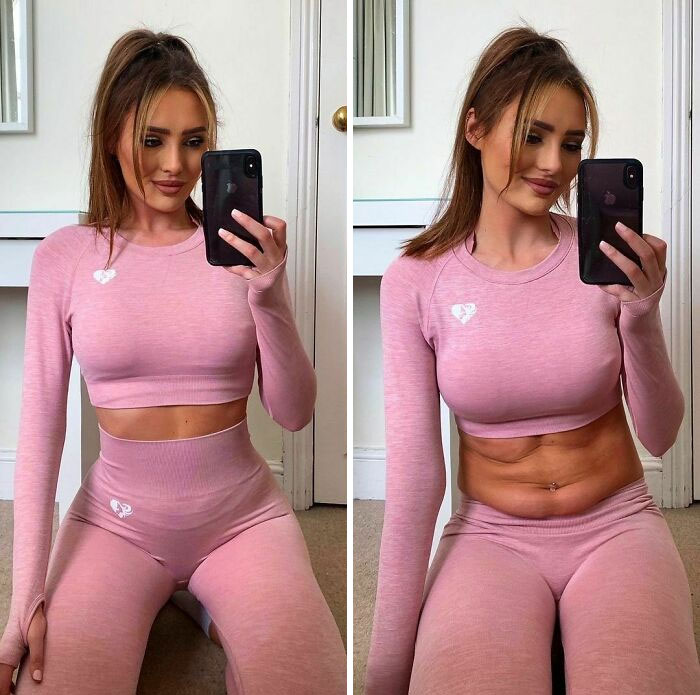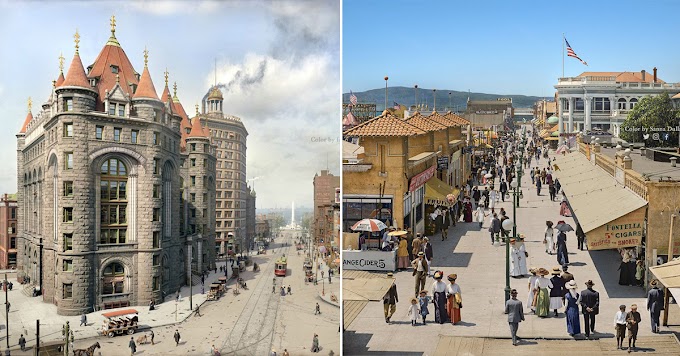Georgie Clarke, a blogger with 690K followers, has been working on a series to tell them not to believe everything we see on social media. She's doing a great job of it.
Each post has two shots taken one minute apart and puts next to each other. The same clothes, the identical make-up (or lack thereof), and everything else are the same. The only difference is how they were taken. The first was taken to make Clarke look as good as possible, while the second looks like it was just brought to remember the moment.
As we scroll, it becomes clear that all the perfect people we see on our feeds and use to judge ourselves aren't perfect. They remember to flex their muscles and pull in their stomachs before the camera. The person behind the camera knows how to find the best light and flattering angle.
More Info & Images Credit - Instagram
Meet Georgie Clarke, a writer from the UK who used to have problems with how she looked but has now learned to accept and love herself.
In one of her posts, the writer said, "It's no secret that my mental health has in the past affected how I looked and how I felt about myself." "When I used to fight mentally, my body would pay for it. I didn't take care of myself, and I was so hard on myself and how I looked."
"This was a never-ending cycle I had to deal with for years, but I never got help or got to the bottom of what was going on in my head."
One thing that helped her do it was being honest with herself and with other people.

"After a few years and a lot of therapy, self-love, and kindness toward myself, I'm happy to say I'm the happiest and healthiest I've ever been, and my relationship with my body is just as important as my relationship with my brain. And wow, you can really tell the difference," she said.
"I now have the tools to care for myself if my mental health worsens. It's taken me so long to learn these tools, but I still see how important it is to take care of myself or ask for help because I'm kind to myself and love myself.
Clarke has been posting pictures next to each other to show there's more to social media than meets the eye.
"This is a reminder that even if someone looks happy in a picture, it doesn't mean they aren't going through their own problems."
Georgie's series is interesting because they can make a more significant difference than you might initially think. In 2019, Marika Tiggemann and Isabella Anderberg published a study called "Social Media is not real: The effect of "Instagram vs Reality" pictures on women's social comparison and Body Image." The study showed that these kinds of pictures could lessen the harmful effects that social media can have on our mental health.
As part of the study, a group of women were randomly given to see either the "Instagram vs reality" images, the "ideal" side alone, or just the "real" side. Researchers found that when women saw the actual or comparison posts, recognizing or altogether avoiding the "perfect" pictures kept them from comparing themselves to impossible beauty standards. This made them happier with their bodies.
"When we compare ourselves to others, it's always the best parts we see."
"But the truth about those pictures is never shown."
"We're all people, and learning to love ourselves is a hard but worthwhile journey."




But there are times when it's better to turn off Instagram. We seem to be sadder the more we use social media.
One study found that using Facebook was tied to less happiness at the moment and less satisfaction with life. The more people used Facebook daily, the more these two things decreased.
The authors thought that this might be because Facebook makes people feel alone in a way that other things that people do alone don't. "On the surface, Facebook is a great way to meet these goals because it lets people connect immediately. The current results show that interacting with Facebook may have the opposite effect on young adults' well-being than frequent interactions with supportive social networks that happen "offline." "It may hurt their well-being," the researchers wrote.
Another study backs up this idea. It found that using social media is linked to having more feelings of being alone. The team looked at how much people used 11 social media sites, including Facebook, Twitter, Google+, YouTube, LinkedIn, Instagram, Pinterest, Tumblr, Vine, Snapchat, and Reddit, and compared that to how "socially isolated" they felt. Not surprisingly, people felt more lonely the more time they spent on these sites.
























0 Comments